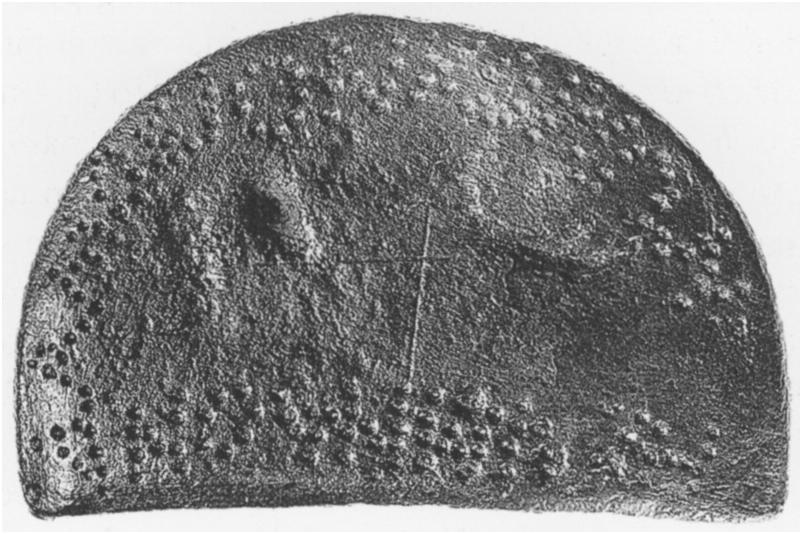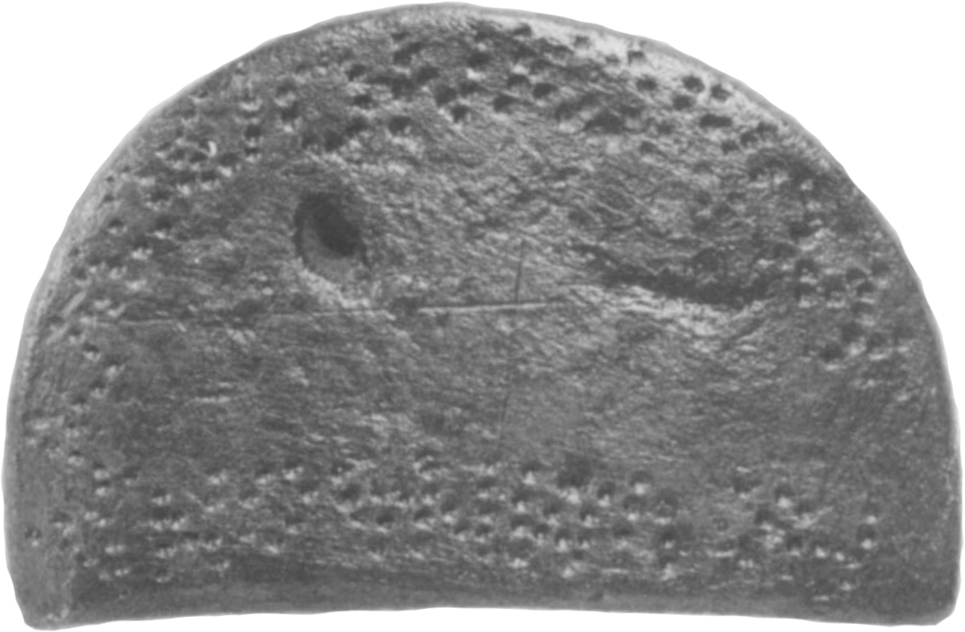
-
Copyright credit: Donati 2010

-
Copyright credit: Williams and Fisher 1972

ARCHAEOLOGICAL DESCRIPTION OF THE WEIGHT
Authority
Mint
Corinth
Denomination
1/2 Mina
Material
Copper alloy (bronze or brass)
Manufacture
Cast
Shape
Disc or similar (ellipse, etc.)
Length
7.40 cm
Width
- cm
Height
0.90 cm
Metrology
| Mass (g) | Mass (grain) | Date of measurement | Reference | fragmented | cleaned | reference weight |
|---|---|---|---|---|---|---|
| 207.00 | - | - | Donati 2010 | No | No | Yes |
Iconography
| Symbol | Technique | Direction | Position | Number | Synecdoche |
|---|
Wear
Corrosion
Handle
No
Suspension hole
No
Recarved mould
No
Recarved weight
No
Intentionally destroyed
No
Archaeological description
Tekin 2016a: In 1971, excavations at the Forum, another semicircular weight was uncovered; this example is of bronze and weighs 207 g. Based on the context it was found, it is dated to the second half of the fourth century BC. One side is engraved with the legend ΔΑΜΟΣΙΟΝ ΚΟΡΙ(νθι)ΩΝ ΗΜΙΜΝΑΙΟΝ while the other side is blank. / Donati 2010: Semicircular bronze weight, half-mina; from left to right around the curved edge: δαμόσιον Κορι(νθί)ων ; from right to left, upside down on the lower edge: ἡμιμνάον. Intact semicircular weight that is slightly lunate; deep pocket and scratches on obverse; few pocket marks on reverse. Punched inscription on the obverse. Κορίων is an abbreviation of the city ethnic Κορι(νθί)ων. To my knowledge, this weight is the only instance where a shorthand of the Corinthian city ethnic is attested. Its weight indicates that a full mina should be about 414 g, which is consistent with other Corinthian weights that correspond to a Corinthian mina, about 412.50 g. / Williams-Fisher 1972: Bronze half-mina weight, inscribed. pl. 27. MF-71-48. Radius 0,046, Th. 0,009 m. Weight 206,8 grams. Intact. Hemispherical bronze weight, punched inscription around edges on one face: ἡμιμνάον on flat edge, δαμόσιον Κορίων on curved edge. Corinthian mina of 412,50 grams; see Corinth XII, p. 204.
Autopsy
No
INSCRIPTION
| Language | Technique | Legend type |
|---|---|---|
| Greek | Dotted | Denomination, Mint |
Fac simile
ΔΑΜΟΣΙΟΝ ΚΟΡΙΩΝ
ΗΜΙΜΝΑΟΝ
Edition
Δαμόσιον Κορι(νθί)ων | ἡμιμνάον.
Monogram
ARCHAEOLOGICAL CONTEXT
Findspot (region)
Greece: Corinthia
Findspot (site)
Archaia Korinthos [Corinth / Corinthus]
context
Donati 2010: Excavations at the Forum in a context of the second half of the fourth century BC (1971). In a drain (Drain 1971-1) between Buildings I and II.
CIRCUMSTANCES OF ACQUISITION
Region
City
Date of first acquisition
circumstances
DATING OF THE WEIGHT
Curatorial Section
GREEK
Time frame
FROM
-400
TO
-300
Comments on Chronology
4th c. BC
COLLECTION HISTORY
Collection
| Name | Date of acquisition | Inventory number |
|---|---|---|
| Archaeological Museum of Ancient Corinth | None | MF-71-48 |
Bibliography
| Reference | Page/Column | Reference (number) | Plate / Figure | Comment |
|---|---|---|---|---|
| Williams and Fisher 1972 | 162 | 52 | pl. 27/52 | None |
| Donati 2010 | 11, 19 | 8 | fig. 14 | None |
| Kroll 2012 | 112, n. 6 | None | None | None |
| Tekin 2016a | 47, 49 | None | None | None |
VARIA